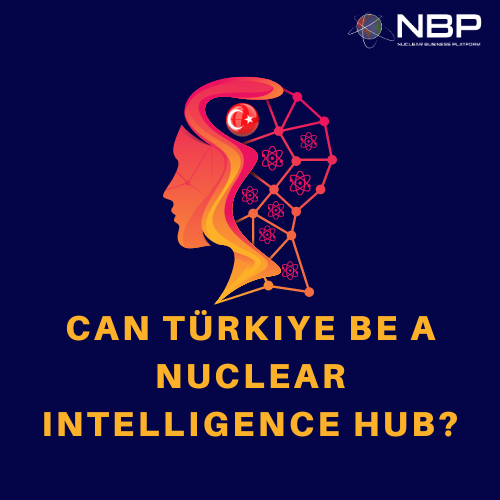Can Türkiye Be A Nuclear Intelligence Hub?
Türkiye, a nation straddling the crossroads of Europe and Asia, has been making significant strides in various sectors, including education and technology. As the world seeks cleaner and more sustainable energy solutions, nuclear power has emerged as a vital contender. As the first Akkuyu NPP unit nears completion and plans for future NPP installations in Sinop and Ignaeda take shape, Turkiye's progress in becoming a nuclear intelligence hub is gaining momentum, heralding a new era of pioneering achievement. Turkiye's strategic location, educational focus, and determination to cultivate expertise in this field make it an important candidate to become a center for nuclear intelligence and engineering. This article delves into Turkiye's journey toward fostering a skilled nuclear workforce and its potential role in the nuclear intelligence landscape.
A Strategic Geographic Advantage
Türkiye's strategic location, situated between Europe and Asia, and its shared borders with eight countries, as well as its proximity to major energy stakeholders and emerging economies, gives it a distinct advantage in becoming a hub for nuclear intelligence. Being situated near both developed and developing nations facilitates effortless exchange of knowledge and cooperation. Turkiye's geographical centrality allows it to act as a bridge connecting Eastern and Western nations, as well as developed and developing regions fostering connections with diverse regions, and enhancing its potential to emerge as a nucleus for nuclear expertise.
Educational Investment and Focus
The foundation for Turkiye's potential as a nuclear intelligence hub lies in its educational commitment. Turkish universities have been expanding their nuclear engineering programs, attracting students eager to pursue careers in this specialized field. Dr. Sule Ergun, an associate professor of nuclear engineering at Hacettepe University, stated in an NBP Hotseat that Turkiye's youth prioritize jobs that can make a positive impact on the world, in addition to the job security offered by the nuclear sector. Turkiye fosters international institutions that are well-known for nuclear research, such as those in Russia, China, Japan, the USA, and the UK.
Empowering the Next Generation
Nurturing a skilled nuclear workforce requires a multifaceted approach. Turkiye has the potential to develop cutting-edge research facilities, support scholarships and grants for nuclear engineering students, and collaborate with established nuclear powers to provide comprehensive training opportunities. An agreement between the Ministry of Energy and the Ministry of Education has been made to facilitate internships for nuclear energy students in the UK, USA, Russia, and Germany. Every year, the Ministry of National Education chooses around 500 Turkish students to receive a scholarship for pursuing graduate studies in nuclear fields at foreign universities. Upon completion of their education, these students are required to work at MENR-GDNE, NDK, TENMAK, and EUAS for double the duration of their time abroad. Alongside IAEA's training programs and workshops for the development of human resources in the nuclear industry, the Turkish Energy, Nuclear, and Mineral Research Agency (TENMAK) also provides training for personnel in the nuclear field.
Collaboration and Diplomacy
Becoming a nuclear intelligence hub entails more than just technical expertise; it also requires responsible and transparent diplomatic engagement. Turkiye's proactive diplomacy can help it forge partnerships with existing nuclear powers, enabling knowledge sharing, technology transfer, and regulatory cooperation. As discussions on the second and third nuclear power plants in Turkiye continue, the Akkuyu Nuclear Power Plant is also moving forward. The relevant operators will provide education and operation training for staff, and the IGA with the Russian Federation states that this will be done in the case of Akkuyu NPP without any financial burden on Turkiye. During a conversation with NBP, Dr. Sule Ergun noted that Turkiye has a significant number of professionals from non-technical backgrounds who could aid in the development of nuclear energy. Furthermore, she suggested that involving the private sector in research and development could further advance this effort.
Turkiye's potential to emerge as a nuclear intelligence hub will be a direct result of its unwavering commitment to education, innovation, and strategic collaboration. Boasting a skilled workforce with expertise in all aspects of nuclear energy development and power plant operation, Turkiye is an ideal location for modern and developing nuclear reactors. This means that nuclear power plant installing companies need not bear the high costs of training workers to run their reactors. Furthermore, international companies can now easily hire skilled workers from Turkiye to operate reactors in various countries or serve as training staff. Turkiye is also set to become a repository of nuclear reactor knowledge gathered from feedback from various reactors. These qualities make Turkiye a highly desirable destination for nuclear companies looking to conduct business. As the world seeks to meet its energy demands while minimizing environmental impact, Turkiye's role in the nuclear intelligence landscape could be both transformative and constructive.
Türkiye’s current & future nuclear power programs will be discussed during the Türkiye NBP 2023 conference and exhibition which will take place 6-8 November in Antalya. This industry meeting is hosted by Nükleer Teknik Destek Anonim Şirketi (NÜTED A.Ş.). An exclusive technical site-visit to the Akkuyu nuclear plant site is also scheduled as part of Türkiye NBP 2023
For more information and to download the detailed meeting agenda visit - www.nuclearbusiness-platform.com/turkiye/tnbp-2023



